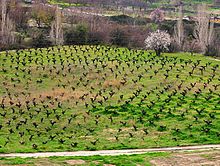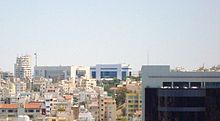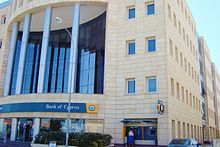- Economy of Cyprus
-
Economy of Cyprus 
Cypriot one euro coinRank 91st (nominal)[1]
109th (PPP)[2]Currency Euro since 1 January 2008 Fiscal year Calendar year Trade organisations EU, Commonwealth, WTO Statistics GDP $25.655 billion (nominal, 2011 est.)[3]
$23.749 billion (PPP, 2011 est.)[3]GDP growth −0.6% (Q3 2011 compared with Q3 2010)[4]
−0.7% (Q3 2011 compared with Q2 2011)[4]GDP per capita $31,435 (nominal, 2011 est.)[3]
$29,100 (PPP, 2011 est.)[3]GDP by sector agriculture 2.3%, industry 17.1%, services 80.6% (2010 est.) Inflation (CPI) 3.0% (October 2011)[5] Gini index 29 (2005) Labour force 407,700 (2010 est.) Labour force
by occupationagriculture 8.5%, industry 20.5%, services 71% (2006 est.) Unemployment 7.8% (September 2011)[6] Average gross salary €1,953 / $2,636, monthly (2006)[7] Average net salary €1,656 / $2,235, monthly (2006)[7] Ease of Doing Business Rank 40th (2012)[8] External Public finances Public debt €10.653 billion (61.5% of GDP; 2010 est.)[9] Budget deficit €923 million (5.3% of GDP; 2010 est.)[9] Revenues 41.0% of GDP (2010 est.)[9] Expenses 46.4% of GDP (2010 est.)[9] Credit rating Foreign reserves US$1.901 billion (March 2011)[14] All values, unless otherwise stated, are in US dollars Economic affairs in Cyprus are dominated by the division of the country into the southern area, controlled by the internationally recognized government of the Republic of Cyprus, and Turkish-occupied northern Cyprus.
Classified by the World Bank as a high-income economy,[15] Cyprus was included by the International Monetary Fund in its list of advanced economies in 2001.[16] Erratic growth rates in the 1990s reflected the economy's vulnerability to swings in tourist arrivals, caused by political instability on the island and fluctuations in economic conditions in Western Europe. On 1 January 2008, the country entered the eurozone and adopted the euro as its official currency, replacing the Cypriot pound at an irrevocable fixed exchange rate of CYP 0.585274 per EUR 1.00.
Contents
Economy in the government-controlled area
 Nicosia, the capital and economic heart of Cyprus.
Nicosia, the capital and economic heart of Cyprus.
Cyprus has an open, free-market, service-based economy with some light manufacturing. Internationally, Cyprus promotes its geographical location as a "bridge" between East and West, along with its educated English-speaking population, moderate local costs, good airline connections, and telecommunications.
Since gaining independence from the United Kingdom in 1960, Cyprus has had a record of successful economic performance, reflected in strong growth, full employment conditions and relative stability. The underdeveloped agrarian economy inherited from colonial rule has been transformed into a modern economy, with dynamic services, industrial and agricultural sectors and an advanced physical and social infrastructure.
The Cypriots are among the most prosperous people in the Mediterranean region, with GDP per capita reaching $30,000.[3] Their standard of living is reflected in the country's "very high" Human Development Index,[17] and Cyprus is ranked 23rd in the world in terms of the Quality-of-life Index.[18]
However, after more than three decades of unbroken growth, the Cypriot economy contracted in 2009.[19] This reflected the exposure of Cyprus to the global recession and European sovereign debt crisis. In recent times, concerns have been raised about the state of public finances and spiralling borrowing costs. Furthermore, Cyprus was dealt a severe blow by the Evangelos Florakis Naval Base explosion in July 2011, with the cost to the economy estimated at €1–3 billion, or up to 17% of GDP.[20]
The economic achievements of Cyprus during the preceding decades have been significant, bearing in mind the severe economic and social dislocation created by the Turkish invasion of 1974 and the continuing occupation of the northern part of the island by Turkey. The Turkish invasion inflicted a serious blow to the Cyprus economy and in particular to agriculture, tourism, mining and quarrying: 70 percent of the island’s wealth-producing resources were lost, the tourist industry lost 65 percent of its hotels and tourist accommodation, the industrial sector lost 46 percent, and mining and quarrying lost 56 percent of production. The loss of the port of Famagusta, which handled 83 percent of the general cargo, and the closure of Nicosia International Airport, in the buffer zone, were additional setbacks.
The success of Cyprus in the economic sphere has been attributed, inter alia, to the adoption of a market-oriented economic system, the pursuance of sound macroeconomic policies by the government as well as the existence of a dynamic and flexible entrepreneurship and a highly educated labor force. Moreover, the economy benefited from the close cooperation between the public and private sectors.
In the past 30 years, the economy has shifted from agriculture to light manufacturing and services. The services sector, including tourism, contributes almost 80% to GDP and employs more than 70% of the labor force. Industry and construction account for approximately one-fifth of GDP and labor, while agriculture is responsible for 2.1% of GDP and 8.5% of the labor force. Potatoes and citrus are the principal export crops.
 Port of Limassol, the busiest in Cyprus.
Port of Limassol, the busiest in Cyprus.
After robust growth rates in the 1980s (average annual growth was 6.1%), economic performance in the 1990s was mixed: real GDP growth was 9.7% in 1992, 1.7% in 1993, 6.0% in 1994, 6.0% in 1995, 1.9% in 1996 and 2.3% in 1997. This pattern underlined the economy's vulnerability to swings in tourist arrivals (i.e., to economic and political conditions in Cyprus, Western Europe, and the Middle East) and the need to diversify the economy. Declining competitiveness in tourism and especially in manufacturing are expected to act as a drag on growth until structural changes are effected. Overvaluation of the Cypriot pound prior to the adoption of the euro in 2008 had kept inflation in check.
Trade is vital to the Cypriot economy—the island is not self-sufficient in food and has few natural resources—and the trade deficit continues to grow. Cyprus must import fuels, most raw materials, heavy machinery, and transportation equipment. More than 50% of its trade is with the rest of the European Union, especially Greece and the United Kingdom, while the Middle East receives 20% of exports. In 1991, Cyprus introduced a Value Added Tax (VAT), which is currently 15% in line with the EU minimum. Cyprus ratified the new world trade agreement (General Agreement on Tariffs and Trade, GATT) in 1995 and began implementing it fully on 1 January 1996.
 A vineyard in the Troodos Mountains. The agricultural sector continues to employ a significant proportion of the labor force.
A vineyard in the Troodos Mountains. The agricultural sector continues to employ a significant proportion of the labor force.
EU accession negotiations started on 31 March 1998, and concluded when Cyprus joined the organization as a full member in 2004.
Cyprus has the fourth-largest ship registry in the world, with 2,758 ships and 25.5 million gross registered tons (GRTs). It is an open registry and includes ships from more than 43 countries, including Greece, Germany, and Russia.
Investment climate
In February 1997, the government revised its policy on foreign direct investment, permitting 100% foreign ownership in certain cases. Regulations on foreign portfolio investment in the Cyprus Stock Exchange have also been liberalized. Additionally, Cyprus passed a modern banking law in July 1997, incorporating all the provisions and directives of the EU for the prudential supervision of credit institutions.
Cyprus has concluded treaties on double taxation with 26 countries, and has removed exchange restrictions on current international transactions. Non-residents and foreign investors may freely repatriate proceeds from investments in Cyprus.
 Central Bank headquarters, Nicosia.
Central Bank headquarters, Nicosia.
Economy in the Turkish-occupied area
The economy of Turkish-occupied northern Cyprus is about one-fifth the size of the economy of the government-controlled area, while GDP per capita is around one-third. Because the de facto administration is recognized only by Turkey, it has had much difficulty arranging foreign financing, and foreign firms have hesitated to invest there. The economy mainly revolves around the agricultural sector and government service, which together employ about half of the work force. The tourism sector also contributes substantially into the economy. Moreover, the small economy has seen some downfalls because the Turkish lira is legal tender. To compensate for the economy's weakness, Turkey has been known to provide significant financial aid. In both parts of the island, water shortage is a growing problem, and several desalination plants are planned.
The economic disparity between the two communities is pronounced. Although the economy operates on a free-market basis, the lack of private and government investment, shortages of skilled labor and experienced managers, and inflation and the devaluation of the Turkish lira continue to plague the economy.
Turkey is by far the main trading partner of the Turkish-occupied area, supplying 55% of imports and absorbing 48% of exports. In a landmark case, the European Court of Justice (ECJ) ruled on 5 July 1994 against the British practice of importing produce from northern Cyprus based on certificates of origin and phytosanitary certificates granted by the de facto authorities. The ECJ decided that only goods bearing certificates of origin from the internationally recognized Republic of Cyprus could be imported by EU member states. The decision resulted in a considerable decrease of Turkish Cypriot exports to the EU: from $36.4 million (or 66.7% of total Turkish Cypriot exports) in 1993 to $24.7 million in 1996 (or 35% of total exports) in 1996. Even so, the EU continues to be the second-largest trading partner of northern Cyprus, with a 24.7% share of total imports and 35% share of total exports.
Assistance from Turkey is the mainstay of the Turkish Cypriot economy. Under the latest economic protocol (signed 3 January 1997), Turkey has undertaken to provide loans totalling $250 million for the purpose of implementing projects included in the protocol related to public finance, tourism, banking, and privatization. Fluctuation in the Turkish lira, which suffered from hyperinflation every year until its replacement by the Turkish new lira in 2005, exerted downward pressure on the Turkish Cypriot standard of living for many years.
The de facto authorities have instituted a free market in foreign exchange and permit residents to hold foreign-currency denominated bank accounts. This encourages transfers from Turkish Cypriots living abroad.
See also
- Cypriot pound
- Economy of Europe
- List of Ministers of Finance of the Republic of Cyprus
References
- ^ "Gross domestic product 2010" (PDF). World Bank. 1 July 2011. http://siteresources.worldbank.org/DATASTATISTICS/Resources/GDP.pdf. Retrieved 2 August 2011.
- ^ "Gross domestic product 2010, PPP" (PDF). World Bank. 1 July 2011. http://siteresources.worldbank.org/DATASTATISTICS/Resources/GDP_PPP.pdf. Retrieved 2 August 2011.
- ^ a b c d e "Report for Selected Countries and Subjects". World Economic Outlook Database, September 2011. International Monetary Fund. http://www.imf.org/external/pubs/ft/weo/2011/02/weodata/weorept.aspx?sy=2011&ey=2011&scsm=1&ssd=1&sort=country&ds=.&br=1&c=423&s=NGDPD%2CNGDPDPC%2CPPPGDP%2CPPPPC&grp=0&a=. Retrieved 21 October 2011.
- ^ a b "Flash estimate for the third quarter of 2011" (PDF). Eurostat. 15 November 2011. http://epp.eurostat.ec.europa.eu/cache/ITY_PUBLIC/2-15112011-BP/EN/2-15112011-BP-EN.PDF. Retrieved 15 November 2011.
- ^ "Latest Figures: Consumer Price Index, Oct 2011". Nicosia: Statistical Service of the Republic of Cyprus. 3 November 2011. http://www.cystat.gov.cy/mof/cystat/statistics.nsf/All/CAEF63F400273333C22578DC00328974?OpenDocument&sub=4&sel=1&e=&print. Retrieved 3 November 2011.
- ^ "Euro area unemployment rate at 10.2%" (PDF). Brussels: Eurostat. 31 October 2011. http://epp.eurostat.ec.europa.eu/cache/ITY_PUBLIC/3-31102011-BP/EN/3-31102011-BP-EN.PDF. Retrieved 1 November 2011.
- ^ a b Wages and Taxes for the Average Joe in the EU 2
- ^ "Ease of Doing Business in Cyprus". World Bank. http://doingbusiness.org/data/exploreeconomies/cyprus. Retrieved 21 October 2011.
- ^ a b c d "Provision of deficit and debt data for 2010 - second notification" (PDF). Eurostat. 21 October 2011. http://epp.eurostat.ec.europa.eu/cache/ITY_PUBLIC/2-21102011-AP/EN/2-21102011-AP-EN.PDF. Retrieved 21 October 2011.
- ^ "Fitch - Complete Sovereign Rating History" (Microsoft Excel spreadsheet). Fitch Ratings. 10 August 2011. http://www.fitchratings.com/web_content/ratings/sovereign_ratings_history.xls. Retrieved 6 October 2011.
- ^ "Moody's downgrades Cyprus's bond ratings to Baa3/P-3, on review for further downgrade". London: Moody's Investors Service. 4 November 2011. http://moodys.com/research/Moodys-downgrades-Cypruss-bond-ratings-to-Baa3P-3-on-review--PR_230106. Retrieved 5 November 2011.
- ^ "Sovereigns Ratings List". Standard & Poor's. http://www.standardandpoors.com/ratings/sovereigns/ratings-list/en/eu/?sectorName=Governments&subSectorCode=39&subSectorName=Sovereigns. Retrieved 29 October 2011.
- ^ Psyllides, George (28 October 2011). "S&P downgrades Cyprus after bank haircut". Cyprus Mail (Nicosia). http://www.cyprus-mail.com/standard-and-poors/sp-downgrades-cyprus-after-bank-haircut/20111028. Retrieved 29 October 2011.
- ^ "International Reserves and Foreign Currency Liquidity – CYPRUS". International Monetary Fund. 16 May 2011. http://www.imf.org/external/np/sta/ir/IRProcessWeb/data/cyp/eng/curcyp.htm. Retrieved 31 May 2011.
- ^ "Country and Lending Groups". World Bank. http://data.worldbank.org/about/country-classifications/country-and-lending-groups#High_income. Retrieved 2 August 2011.
- ^ "World Economic Outlook Database May 2001". International Monetary Fund. http://www.imf.org/external/pubs/ft/weo/2001/01/data/index.htm#changes. Retrieved 2 August 2011.
- ^ "Human Development Index (HDI) - 2011 Rankings". United Nations Development Programme. http://hdr.undp.org/en/statistics/. Retrieved 4 November 2011.
- ^ "The Economist Intelligence Unit’s quality-of-life index" (PDF). Economist Intelligence Unit. 2005. http://www.economist.com/media/pdf/QUALITY_OF_LIFE.pdf. Retrieved 2 August 2011.
- ^ "Report for Selected Countries and Subjects". World Economic Outlook Database, April 2011. International Monetary Fund. http://www.imf.org/external/pubs/ft/weo/2011/01/weodata/weorept.aspx?sy=1980&ey=2016&scsm=1&ssd=1&sort=country&ds=.&br=1&c=423&s=NGDP_RPCH&grp=0&a=. Retrieved 2 August 2011.
- ^ Kambas, Michele (30 July 2011). "Cyprus too slow in making cuts". Cyprus Mail (Nicosia). http://www.cyprus-mail.com/cyprus/cyprus-too-slow-making-cuts/20110730. Retrieved 30 July 2011.
- Cyprus entry at The World Factbook
External links
Member states of the European Union Member states by: political system · GDP Economy of Asia Sovereign
states- Afghanistan
- Armenia
- Azerbaijan
- Bahrain
- Bangladesh
- Bhutan
- Brunei
- Burma (Myanmar)
- Cambodia
- People's Republic of China
- Cyprus
- East Timor (Timor-Leste)
- Egypt
- Georgia
- India
- Indonesia
- Iran
- Iraq
- Israel
- Japan
- Jordan
- Kazakhstan
- North Korea
- South Korea
- Kuwait
- Kyrgyzstan
- Laos
- Lebanon
- Malaysia
- Maldives
- Mongolia
- Nepal
- Oman
- Pakistan
- Philippines
- Qatar
- Russia
- Saudi Arabia
- Singapore
- Sri Lanka
- Syria
- Tajikistan
- Thailand
- Turkey
- Turkmenistan
- United Arab Emirates
- Uzbekistan
- Vietnam
- Yemen
States with limited
recognition- Abkhazia
- Nagorno-Karabakh
- Northern Cyprus
- Palestine
- Republic of China (Taiwan)
- South Ossetia
Dependencies and
other territoriesEconomy of Europe Sovereign
states- Albania
- Andorra
- Armenia
- Austria
- Azerbaijan
- Belarus
- Belgium
- Bosnia and Herzegovina
- Bulgaria
- Croatia
- Cyprus
- Czech Republic
- Denmark
- Estonia
- Finland
- France
- Georgia
- Germany
- Greece
- Hungary
- Iceland
- Ireland
- Italy
- Kazakhstan
- Latvia
- Liechtenstein
- Lithuania
- Luxembourg
- Macedonia
- Malta
- Moldova
- Monaco
- Montenegro
- Netherlands
- Norway
- Poland
- Portugal
- Romania
- Russia
- San Marino
- Serbia
- Slovakia
- Slovenia
- Spain
- Sweden
- Switzerland
- Turkey
- Ukraine
- United Kingdom
- (England
- Northern Ireland
- Scotland
- Wales)
- Vatican City
States with limited
recognition- Abkhazia
- Kosovo
- Nagorno-Karabakh
- Northern Cyprus
- South Ossetia
- Transnistria
Dependencies
and other territories- Åland
- Faroe Islands
- Gibraltar
- Guernsey
- Jan Mayen
- Jersey
- Isle of Man
- Svalbard
Other entities - European Union
Categories:- Economy of Cyprus
- European Union member economies
Wikimedia Foundation. 2010.



